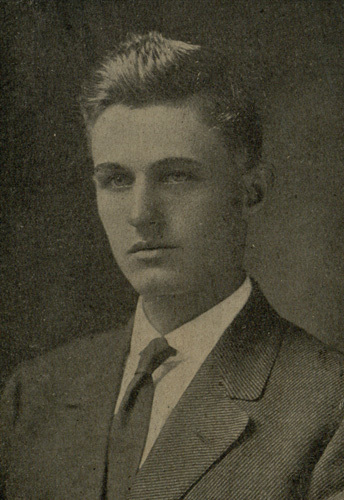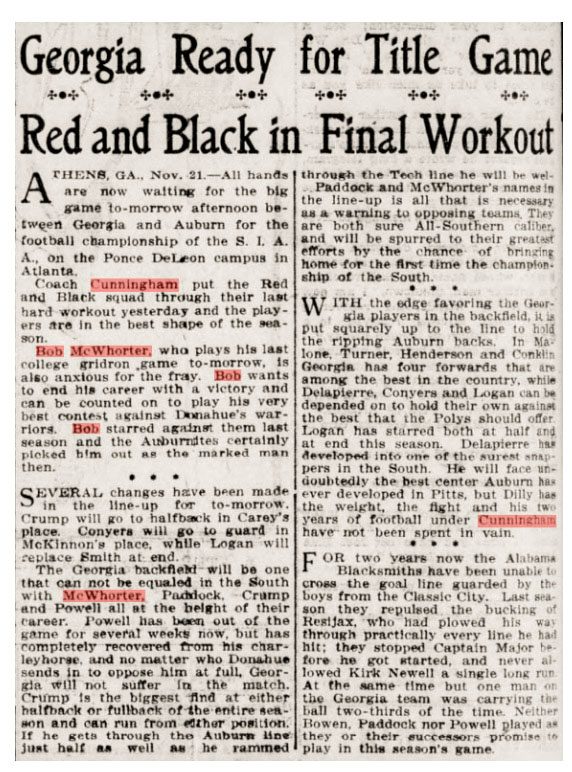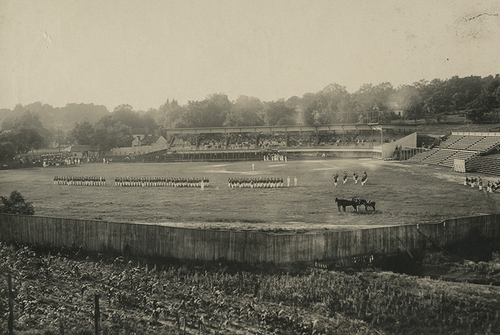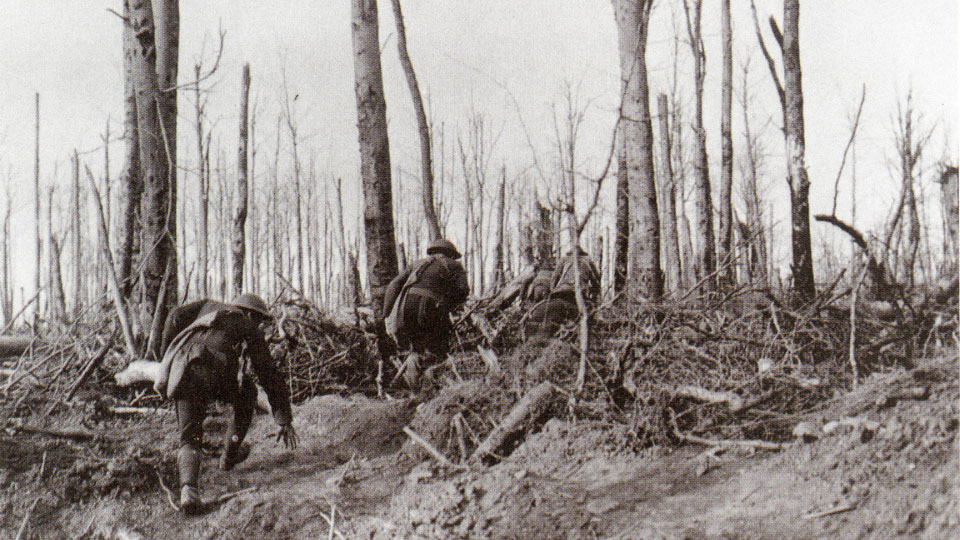One of Georgia’s most successful football coaches was a field general on the gridiron, nearly doubling the team’s all-time victories and coaching the school’s first All-American. And as a Captain in the US Army on the French battlefields of World War 1, he was awarded the country’s second highest miliary honor for bravery and leadership.
(In the 1910 team photo above, Cunningham is in the first row to the far right, wearing a sweater with a large V.)
The rolling hills of Marietta National Cemetery are the final resting place of more than 15,000 American soldiers and their family members. Each headstone hides stories of how brave men and women served to protect our freedoms. And some made the ultimate sacrifice in their service. As Memorial Day approaches, we’ll be sharing stories of these heroes in the Marietta hills.
Ask any Bulldog fan to name the top coaches to lead the University of Georgia football team, and three names come rapid fire: Kirby Smart, Vince Dooley and Mark Richt. And indeed, those three coaches won the most games and have the highest winning percentages during their coaching tenures.
But if you’re looking for a former Georgia head coach who was a football field general and a decorated hero on the battlefields during war, that distinction goes to Colonel William A. Cunningham. He coached the Bulldogs for eight seasons over a 10 year span between 1910 and 1919. During his tenure, Cunningham’s Bulldogs won 43 games, nearly doubling the total wins UGA had achieved in its first 18 seasons. And his all-time winning percentage of 68% puts him in fifth place among Georgia coaches who coached at least 10 games – and only one place behind the legendary Vince Dooley.

Cunningham was hired by Georgia Athletic Director Steadman Sanford after Sanford watched Cunningham coach his Gordon Military Institute baseball team to an 11-0 victory on a visit to UGA. Published reports indicate that after a brief conversation, Sanford offered Cunningham a $1,350 contract on the spot.
Cunningham recruited one of his GMI baseball players to join him at Georgia. That baseball player, Bob McWhorter, became Georgia’s first football All-American in 1913.

College football then wasn’t the multi-million dollar, full-time enterprise it is today. So when he wasn’t coaching UGA football, Cunningham attended Georgia’s law school and served as faculty advisor to the Delta Chapter of the Sigma Chi fraternity.
Oh, and as if that wasn’t enough, Cunningham served as Georgia’s head basketball coach during the 1910–1911 season and again from 1916–1917, compiling a 62% winning percentage.

According to published accounts, Cunningham’s Bulldogs were fierce competitors and among the top teams in the region. But compared to the determination and bravery of their coach, the Bulldogs were mere pups playing together on a peaceful field.
In 1917 and 1918, University of Georgia and many other colleges suspended their sports programs as World War I required young men to serve their countries on a foreign battlefield. Although he was over 30 years old and not subject to being drafted, Coach Cunningham joined the US Army with his football players as new recruits headed to France.
Cunningham served with 321st Machine-Gun Battalion, 82d Division, A.E.F., near Sommerance, France, participating in battles of the Meuse-Argonne offensive. Rain dampened the battlefields in early October. German bombs fell heavily on the US and Allied positions across the front as the Germans fought fiercely to stem the slowly advancing Allied offensive which had broken out of the trench war stalemate.

On Oct. 12, 1918 – on a day when Cunningham likely would have been coaching his team on Georgia’s new Sanford Field – Captain Cunningham led his unit in an attack on the German lines. Painfully wounded in the face by shrapnel when his battalion was seriously engaged in battle, Cunningham continued leading his men through the heavy shell fire.

For his outstanding service, Cunningham was awarded the Army Distinguished Service Cross, the nation’s second highest military honor. The citation lauded Cunningham for his efforts “leading his men with skill and inspiring them with courage” despite his serious head wounds. He also was inducted posthumously into the 82nd Airborne Division Hall of Fame.
After the war, Cunningham returned to his coaching position at Georgia and led the Bulldogs on another winning campaign in the 1919 season. He left UGA after the 1919 season having compiled a final football record of 43–18–9.
Rejoining the US Army, Cunningham also served during World War 2. He ended his Army career with the rank of colonel. Cunningham later served as the professor of military studies at Clemson University from 1943 to 1946.
Colonel Cunningham is buried at Marietta National Cemetery at gravesite Q 181-C





